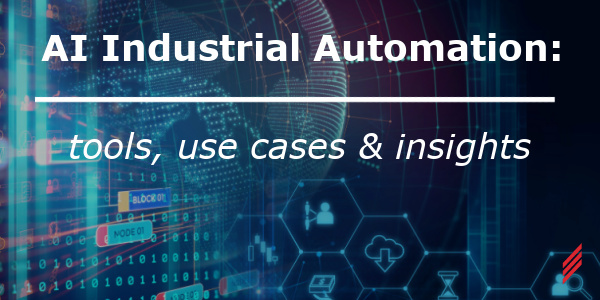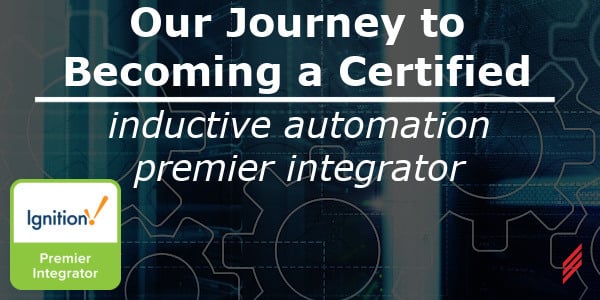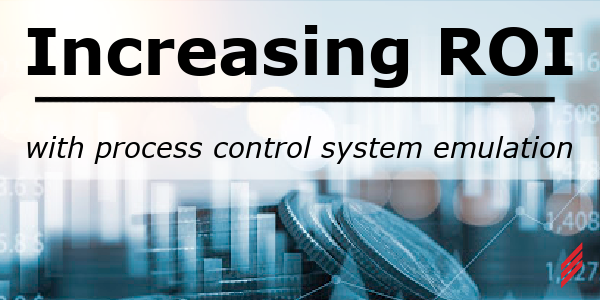AI in Industrial Automation: Tools, Use Cases & Insights
by Christian Bossio on Sep 11, 2025 10:30:00 AM

Artificial Intelligence (AI) has rapidly transitioned from a futuristic concept to a practical tool woven into our daily lives—and the industrial automation sector is no exception. Popular tools like Copilot, ChatGPT, and Gemini are powered by Large Language Models (LLMs), which can understand and generate natural language and code. While these technologies dominate headlines, a quieter but equally important revolution is unfolding within the world of manufacturing and system integration.
Leading automation companies such as Rockwell Automation, Siemens, and Emerson are investing heavily in AI capabilities, often in collaboration with tech giants like Microsoft, IBM and Nvidia. These partnerships are accelerating the development of platform-specific tools designed to enhance the performance, efficiency, and reliability of industrial systems.
Like much in the AI world, the landscape is evolving quickly. In this blog, we’ll provide an overview of the current state of AI tools tailored to system integrators and examine the use cases where AI is making a meaningful impact in industrial automation.
Common Applications of AI in Manufacturing and Industrial Systems
AI is not just about futuristic robots or self-thinking machines – it’s about data, prediction, and insight. Below are several key areas where AI is already improving operations in industrial environments:
- Predictive Maintenance
Using machine learning to detect patterns in equipment performance and forecast failures before they occur. This reduces maintenance and unplanned downtime and extends asset life. - Quality Control
AI-powered vision systems can detect product defects more accurately and consistently than human inspectors or rule-based systems. - Supply Chain Management
AI helps manage procurement, logistics, and inventory using real-time data and predictive analytics to optimize decision-making and reduce waste. - Resource & Energy Management
AI tools can analyze system loads and operational data to optimize energy consumption, reducing both cost and environmental impact. These tools can be used independently or integrated into your Power Monitoring Systems. - Digital Twins
AI enables advanced simulation models, or “digital twins,” which mimic real-world processes. These can be used for testing, monitoring, or optimization without impacting production systems.
AI Tools for System Integrators
Whether you’re designing control systems, building SCADA solutions, or delivering turn-key automation projects, AI can support your workflow in both technical and operational capacities. System integrators can benefit from widely available AI tools that streamline design, development and project workflows. LLM tools like ChatGPT, GitHub Copilot, and Gemini can assist with code generation, scripting, technical documentation, and troubleshooting.
These tools are helpful for generating, optimizing and augmenting scripts, creating PLC logic snippets, drafting functional specifications, and even brainstorming architectures or design options. Paired with your engineering expertise, these AI assistants can reduce development time, automate repetitive tasks, and provide quick answers or examples across a wide range of topics.
Platform-Specific AI Tools
Many industrial automation platforms are integrating AI features directly into their ecosystems—often with a focus on analytics, diagnostics, and optimization.
- Rockwell Automation – FactoryTalk Analytics
This suite includes AI-driven analytics, performance dashboards, and integration with Microsoft Azure Machine Learning. FactoryTalk Analytics and ThingWorx (via PTC partnership) enable predictive maintenance, anomaly detection, and real-time decision-making. - Siemens – Industrial AI and Industrial Edge
Siemens offers AI-enabled capabilities in its TIA Portal and Industrial Edge ecosystems. These tools allow local or cloud-based deployment of machine learning models directly to PLCs, controllers, or edge devices. Siemens is also working with NVIDIA to bring AI decision-making closer to the edge (live data). - Inductive Automation (IA)
Ignition’s open architecture makes it a good candidate for integration with AI models. Third-party modules and Python scripting allow engineers to deploy custom machine learning algorithms or connect to cloud AI services (like Azure, AWS, or Google AI). There is even a pre-built ML Manager in Ignition Exchange. - Emerson – Plantweb Optics and AI Integration
Emerson has embedded AI into its Plantweb digital ecosystem, I including predictive analytics, asset performance management, and process optimization features. AI models can run within edge controllers or cloud-based platforms for diagnostics and forecasting.
Cloud & Hybrid AI Platforms for Integration
Many system integrators are also combining traditional automation systems and platforms with powerful cloud AI tools to build more intelligent systems.
- Azure AI / AWS SageMaker / Google Vertex AI
These platforms provide model training, predictive analytics, and integration APIs for industrial data. They can ingest process data via MQTT, OPC-UA, or custom middleware, making them suitable for layered analytics on top of SCADA systems. - IBM Maximo and Watson
Especially strong in asset performance management and maintenance scheduling, IBM’s AI suite can be integrated with plant-level data systems for end-to-end visibility. - HighByte Intelligence Hub & Canary Labs
While not AI tools themselves, these data infrastructure platforms help prepare and contextualize operational data, making it usable by AI/ML systems and ensuring quality for analytics. Contextualized data can be used to train AIs that understand your control systems.
What This Means for End-Users
Whether you run a small facility, oversee automation at a fully integrated plant, or simply monitor a SCADA system, AI tools can bring meaningful benefits. From improving plant performance and operational efficiency to enhancing asset reliability and decision-making, AI offers new ways to optimize, simplify, and scale your operations—regardless of your current level of automation. Here’s how end-users are already benefiting:
- Better Visibility & Faster Decisions
AI tools turn operational data into actionable insights. Whether through dashboards, alerts, or forecasting tools, plant managers and engineers gain faster access to what matters most. - Future-Proofing Your Operation
AI doesn’t require ripping out your current systems. With proper integration, it can be layered onto your existing infrastructure to enhance performance and scale with your growth. - Higher Quality Output
AI-driven vision systems and real-time monitoring can improve product consistency and traceability, even in high-throughput environments. - Energy and Cost Savings
AI can analyze production and utility data to reduce peak energy loads, eliminate wasted runtime, and recommend system changes that reduce costs and improve sustainability. - Less Downtime, More Uptime
AI-powered predictive maintenance tools help identify equipment issues before they become critical—minimizing unplanned outages and extending asset life without increasing manual labor.
What This Means for System Integrators
For system integrators, AI is not here to take your job or replace your expertise – it is here to amplify it. The value lies in combining deep domain knowledge with smarter tools to create better systems. By using AI, system integrators can design, develop and test PLC, SCADA or custom applications faster. Like in almost any field, LLMs can be used to make repetitive or mundane tasks easier than ever in the automation world – even generating code.
New project opportunities will also arise as clients attempt to deploy new AI systems to manage, visualize and optimize their sites. The focus should shift to using AI systems and tools to deliver high-value systems with future-ready architectures and embedded intelligence to support site-management’s decision-making and optimization efforts.
Conclusion
Whether you're exploring AI for your internal engineering workflows or deciding on intelligent automation strategies, understanding and adopting these tools early gives you a competitive edge.
The industrial AI space is growing fast – but it’s not just for the biggest players anymore. With open platforms, cloud integration, and increasingly accessible tools, almost any manufacturing site can begin leveraging AI in their projects today. The possibilities are endless.
Looking to build an internal knowledge base, explore predictive analytics, or integrate AI-driven diagnostics into your next project? Our team is actively exploring these solutions and testing these technologies—we’d love to help you take the next step towards the Rise of AI.
About the Author
Christian is a system integrator with experience in the design, documentation, and development of automated control systems across both validated and non-validated environments. He enjoys collaborating with clients from different industries and applying automation concepts to improve processes and operations.
Read My Hallam Story
About Hallam-ICS
Hallam-ICS is an engineering and automation company that designs MEP systems for facilities and plants, engineers control and automation solutions, and ensures safety and regulatory compliance through arc flash studies, commissioning, and validation. Our offices are located in Massachusetts, Connecticut, New York, Vermont and North Carolina, Texas and Florida and our projects take us world-wide.
You May Also Like
These Related Stories

Our Journey to Becoming a Certified Inductive Automation Premier Integrator

Ensure Data Integrity in cGMP: The Crucial Role of Validation Processes



No Comments Yet
Let us know what you think